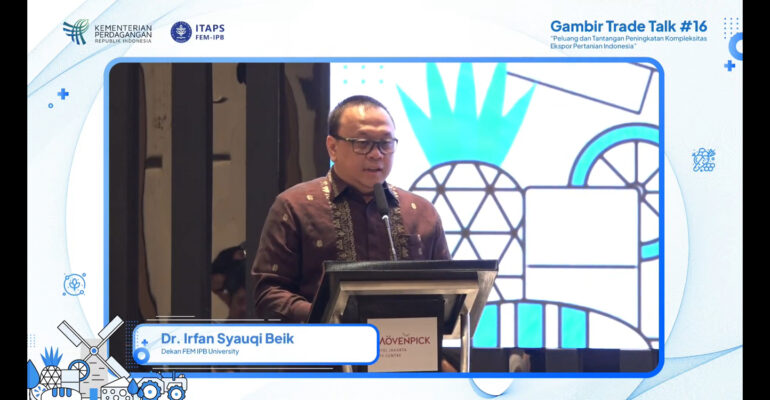ITAPS FEM IPB University Supports the Increase of Indonesian Agricultural Exports through Innovation and Downstreaming

Indonesia faces great challenges in increasing agricultural exports to support the country’s economy. One of the strategic efforts being undertaken is through the downstreaming of the agricultural sector, which was presented in the 16th Gambir Trade Talk (GTT) Policy Dialogue in Jakarta (17/10).
The forum was organized by the Ministry of Trade in collaboration with the International Trade Analysis and Policy Studies Faculty of Economics and Management (ITAPS) of IPB University.
Dean of the Faculty of Economics and Management (FEM) IPB University, Dr Irfan Syauqi Beik, opened the event by stating the importance of the agricultural sector in Indonesia’s economic growth.
“The agricultural sector as the backbone of the Indonesian economy has great potential to be developed. However, the challenges faced are quite complex,” he said.
One of the issues raised was the high average age of farmers, which now reaches 60 years, which requires innovations such as technology-based agricultural systems to overcome the problem.
The downstream agriculture sector was also highlighted at the forum. Dr Sahara, Director of ITAPS FEM IPB University, explained the importance of downstreaming to transform raw commodities into high value-added products that can increase Indonesia’s competitiveness in the global market.
“If we export raw coffee, the value is much lower than if we export premium processed coffee,” she said.
He continued, downstreaming focuses on processing agricultural products, such as processing palm oil and fishery products, to increase added value and open wider market access. For example, palm oil products processed into cosmetics have a much higher added value than raw crude palm oil (CPO).
“IPB University also plays an active role in creating innovations in the agricultural sector by opening the Smart Agriculture Study Program, which utilizes the latest technology to advance agriculture,” she explained.
In addition to technology, improving the quality of human resources (HR) in the agricultural sector is also very important. IPB University, through the Artificial Intelligence (AI) Program at the School of Data Science, Mathematics and Informatics, aims to create experts who are ready to face future challenges.
At the global level, she continued, Indonesia still faces major challenges in terms of export complexity compared to countries such as China and Vietnam. Although Indonesia is a major producer of commodities such as palm oil and coffee, these products have not been maximally processed, resulting in low added value.
In this case, the downstreaming of agricultural products that have comparative advantages in each region can improve the industrial structure and economic equity.
“Indonesia has great potential in the downstream sector. But to achieve this, we need to ensure better regulations and adequate technology,” Dr Sahara added.
Going forward, she said the downstreaming of agricultural products that prioritize sustainability and the adoption of green technology will be key to improving Indonesia’s competitiveness in the global market.
“Through collaboration between the government, academics, and business actors, it is hoped that Indonesia’s agricultural sector can develop rapidly, overcome structural challenges, and achieve the vision of a Golden Indonesia 2045,” she said. (MW/Rz) (IAAS/ZQA)



